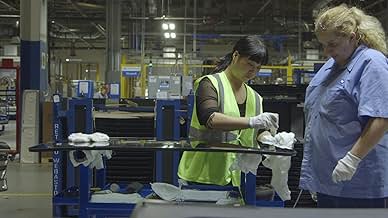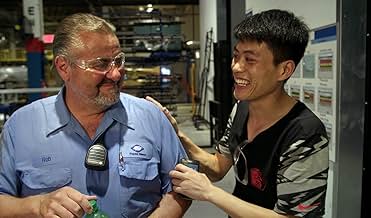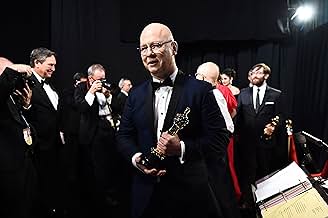Em Ohio pós-industrial, um bilionário chinês abre uma nova fábrica. Os primeiros dias de esperança e otimismo deram lugar a contratempos quando a China de alta tecnologia se choca com a clas... Ler tudoEm Ohio pós-industrial, um bilionário chinês abre uma nova fábrica. Os primeiros dias de esperança e otimismo deram lugar a contratempos quando a China de alta tecnologia se choca com a classe trabalhadora americana.Em Ohio pós-industrial, um bilionário chinês abre uma nova fábrica. Os primeiros dias de esperança e otimismo deram lugar a contratempos quando a China de alta tecnologia se choca com a classe trabalhadora americana.
- Ganhou 1 Oscar
- 19 vitórias e 49 indicações no total
- Self - Furnace Off-Loader
- (as Bobby)
Avaliações em destaque
However, this is a fine piece of work.
It tells the story of a Chinese windscreen-manufacturer reseeding the site of a massive General Motors factory in Dayton Ohio some three years after its closure.
The main premise of the film is that this is a meeting of two cultures, both business and anthropological, and how the rise in Chinese commercial enterprise, even deep in rust-belt, Republican USA, is a success that won't go away.
But the Chinese drive a hard bargain: much lower wages, poorer health and safety ideology, an intolerance of unions and a hard work ethic (in China overtime is compulsory, not optional).
The filmmakers - Stephen Bognar and Julia Rheichert - are seasoned pros and have an interesting technique that makes this such an agreeable watch. It's not controversial, there's little humour and there are no pyrotechnics. It's just a laconic stroll through the lives of the people on both sides of this cultural ravine, gradually exposing what it's like for each of them.
They take no sides, they critique no-one, but clearly there is stuff in here that could enrage a very large percentage of its viewers, no matter their cultural persuasion.
That's what makes it work. That and a good soundtrack and a pleasing use of cinematography.
It's not doc of the year, for me, but it IS an intelligent piece of documentary film-making that is as far from the Michael Moore one-sided tidal-wave of opinion and argument as one could get, and, for that, it is to be admired.
Co-directors Steven Bognar and Julie Reichert share an Oscar nomination (she has 3 total) for their 2009 documentary short, THE LAST TRUCK: CLOSING OF A GM PLANT. This time out, they have impressive access to a remarkable situation: a successful Chinese company opening a factory in the United States, and attempting to merge two distinctly different cultures. We hear much these days about globalization, and by the end of the film, you'll likely be re-defining the word.
This unique business model came with good intentions on both sides. The differences that start out as kind of funny and well-intentioned turn into hurdles that are nearly impossible to manage. Fuyao ships many workers from China to Dayton for the training of U.S. workers. These 'temporary' transplants must spend two years away from their family as they try to make sense of an unfamiliar land far different from home. Workshops are held for the Chinese workers as they are lectured on what makes Americans different ... they don't work as hard, they don't dress well, they talk too much on the job, they won't work overtime, etc. The Chinese blatantly state that they are superior to American workers - a point that's difficult to argue against when it comes to dedication, quality, and efficiency. We soon learn there is more to the picture.
U.S. labor and safety laws exist for a reason, and the Chinese company neither understands these, nor is very willing to abide by them. Additionally, since this is the 'rust belt', the shadow of unionization hovers from day one. While China's Workers' Union functions in sync with companies, U.S. labor unions are regularly in conflict with companies here. When the U.S. supervisors make a training and observation trip to China to see the Fuyao factory, the differences become even more obvious. The mostly overweight Americans show up casual - one even in a JAWS t-shirt - while the lean and fit Chinese are all in fine suits and ties. Morning shift routines are also contrasted to point out the gaps in discipline and attention to details.
What the filmmakers do best is allow us to see both sides of the issue. Surely the right thing to do is obvious when it comes to safety, and when Chairman Cao says the real purpose in life is one's work, well, we realize these two cultures are farther apart than the 7000 miles that separate them. It's a fair look at both sides, but for those who say U.S. companies are too focused on profit, they'll likely be surprised to learn that Chinese factory workers typically get 1 or 2 days off from work each month! As one of the dismissed American managers states, you can't spell Fuyao with "fu". The film seems to present a debate with lines drawn via citizenship and culture, and the contrast might be more relevant today than ever before.
At the Q&A at the premiere at IFC Center, co-director Julia Reichert was at pains to stress that the film was never meant to be polemical, that this was an effort to immerse and learn. While some of the silllier aspects of both cultures, (but especially the regimented and self-congratulatory aspects of the Chinese). come through with particular acuity, you can't help buy muse on how Americans have acted with equal tin-earedness and cultural arrogance around the world, over many more decades than the Chinese have been at this game.
At the same time, America's neediness of manufacturing jobs, even if they don't pay a living wage, and the ways that so many of what we would normally consider our core values go out the window to accommodate anyone who will invest in them, come through particularly clearly. This all comes together in a fight over the establishment of a union that would protect workers' rights and uphold our eroding safety and environmental standards that is the vivid core of the movie.
A final note: This film has an extraordinarily compelling musical score by someone names Chad Cannon that propels and highlights the narrative and is amazingly effective on its own terms. Although the idiom is different, Cannon's score does for this film much of what Philip Glass's have done over the years for the films of Errol Morris, and that is high praise indeed.
Você sabia?
- CuriosidadesDirectors Steven Bognar and Julia Reichert previously worked on the short documentary The Last Truck: Closing of a GM Plant (2009). It is about how the plant was shut down by General Motors, a topic in this movie.
- Citações
Himself - Fuyao Safety Director: Everybody at every level will say that we really, really want to be safe. But safety doesn't pay the bills.
- ConexõesFeatured in The Oscars (2020)
Principais escolhas
- How long is American Factory?Fornecido pela Alexa
Detalhes
- Data de lançamento
- País de origem
- Central de atendimento oficial
- Idiomas
- Também conhecido como
- American Factory
- Locações de filme
- Empresas de produção
- Consulte mais créditos da empresa na IMDbPro
- Tempo de duração1 hora 50 minutos
- Cor
- Mixagem de som
- Proporção
- 1.78 : 1
- 1.85 : 1
Contribua para esta página

































